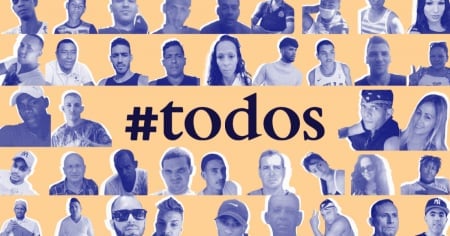The Cuban regime issued new warnings to the recently released political prisoners under the benefit of early release, stating that they could be detained again if they do not meet the imposed requirements.
These statements were made on Friday during the state-run television program "Hacemos Cuba", which in its latest episode addressed the "National Exercise for Prevention and Confrontation of Crime and Social Indiscipline."
During the program, Colonel Danisét González Sánchez, head of the Information and Analysis Department of the General Directorate of the Revolutionary National Police (PNR), confirmed that meetings were held with individuals on parole, which even included high-ranking government officials.
“In the case of the meetings with criminal elements, individuals who are already under police surveillance were drawn in. Moreover, individuals who are currently enjoying the benefit of early release were also brought to these meetings,” explained González Sánchez.
The presenter of the program, Humberto López, took the opportunity to ask what had happened to some of the attendees of those meetings, who had not returned home.
"You tell me if I am right or not. I was told that in some places they called some who went to the meeting and didn't return home. Is that true, is it correct? Can they do that, is it legal? Why? What is the purpose of this action?" López asked with malicious eagerness.
The coronel responded: “Regarding those who were detained, I can tell you that there were sufficient elements indicating that they had violated the requirements under which they were granted benefits for those behaviors.”
"In the exercise, the intention was aimed, as part of the prevention activity, to exert greater influence and control over individuals displaying maladaptive behavior in the community, but also over those prone to committing crimes," added the PNR officer.
Veiled threats and police surveillance
According to González Sánchez, the regime maintains strict surveillance over individuals released under the benefit of early release, as well as those considered likely to commit crimes.
"People who are already under police surveillance were drawn to these meetings," González stated, justifying the arrests by arguing that "there had been a whole prior stepped-up effort involving the police, the family, community factors, and prevention groups."
This intimidation strategy is part of a broader tactic by the Cuban government to control the opposition and civil society.
Cuban authorities have intensified their rhetoric and actions as part of the anti-corruption campaign promoted by Miguel Díaz-Canel, which has resulted in the detection of tax violations amounting to 72 million pesos, the , and the closure of hundreds of private businesses across the island.
In recent weeks, the regime has intensified its repressive actions, with more than 3,300 arrests and summary trials, according to recent reports.
The exercise of prevention has also been used as a tool to discredit activists and opponents. Through state television, the regime has attempted to associate dissent with criminal activities and has intensified its rhetoric against those who denounce the situation in the country.
In the broadcast of "Hacemos Cuba," it was emphasized that control operations will remain active and that conditionally released individuals can be detained again if they do not comply with the strict conditions imposed.
"These individuals who had not managed to change their behavior were arrested and charged with the crime of disobedience," stated the representative from MININT invited to López's program, a government-supporting host known for defaming and discrediting activists, as well as intimidating independent civil society.
The airing of the ill-fated program last Friday reflects the regime's growing concern about social discontent and its intention to maintain strict control over opponents and the general public.
Although the "National Exercise for Prevention and Counteraction Against Crime and Social Indiscipline" took place in early December 2024, it was not until Friday that the Cuban regime devoted television airtime to it, intentionally highlighting the threat of a return to prison for those political prisoners granted early release, who began to be released in mid-January 2025.
The threat of new arrests for those released on early parole confirms the government’s strategy of repression and intimidation as mechanisms of social control.
Despite official efforts to project an image of order and legality, independent reports and civil society complaints continue to expose the reality of a country marked by political persecution and a lack of legal protections for its citizens.
Filed under:
